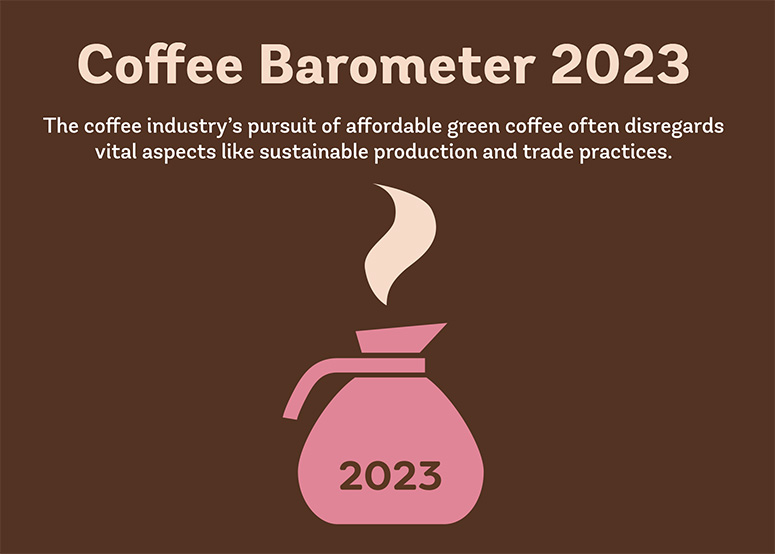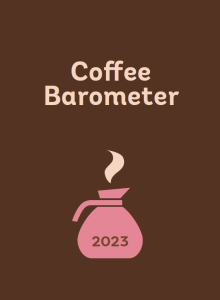


An important global coffee report that monitors sustainability claims was released yesterday, and paints the picture that the industry has reached a crisis point in meeting its own climate targets.
“… the coffee sector finds itself immersed in a state of crisis.” … “Amidst the grand claims of sustainability and rosy promises of a prosperous future in coffee agriculture, the harsh reality faced by coffee producers is marked by price volatility and rising production costs … Coupled with rampant inflation and the profound consequences of a rapidly changing climate in the most vulnerable origins.” (2023 Coffee Barometer)
The Coffee Barometer, published at coffeebarometer.org and supported by Conservation International, Solidaridad, Ethos Agriculture and Belgiun and German development agencies, reports on the coffee industry’s attitude and progress towards climate readiness and sustainable supply chains; and is widely recognized as the most accurate “mainstream” depiction of where the coffee industry sits with regards to sustainability.
The last Coffee Barometer report, published in 2020, summed up the “all talk but no action” existing claims and efforts of the biggest coffee corporations, (like Olam, Nestle and Starbucks) as “disappointing”.
This new 2023 report identifies that coffee has now clearly reached a crisis point.
What it Summarizes
- Coffee growing habitat is at severe risk … Projecting a loss of 45.2% of global Arabica production by 2050 (due to loss of suitable habitat). Poses an even greater threat to existing high elevation forests.
- The exploitive and extractive nature of coffee will keep millions of growers below the poverty line.
- The new EU Deforestation Law (10 years in the making) is the first big government regulation requiring commodities like coffee and cocao to prove their supply chains did not contribute to deforestation in order to be approved entry. However, so far the largest coffee companies are challenging the law rather than incorporating the needed changes to be compliant, claiming that the burden will ultimately hurt the farmers.
- Key finding about coffee’s carbon footprint state an increasing loss of more than 130,000 hectares of forest each year, equaling approximately 45 million metric tonnes of carbon emissions.
- The coffee industry is opaque and doesn’t disclose the basic information needed for global stakeholders to properly assess supply chains.
- Multi-stakeholder initiatives (MSIs) like Global Coffee Platform (GCP) and Sustainable Coffee Challenge (SCC), that include associations and recognized NGOs, are allowing companies to benefit from media attention that make it seem like they are acting on climate when they aren’t having any impact (essentially green-washing). “[Multi-stakeholder Initiatives] allows them to portray themselves as “taking action” while conveniently sidestepping the more complex and contentious issues.” (2023 Coffee Barometer)
Conclusion & Next Steps
The report paints a scary picture for high elevation tropical forests, coffee farmers, and people all over the world affected by climate change. So, everyone.
But there is hope in action …
From the report: “Clearly, agroforestry should not be seen as a substitute for natural forests, but rather as a means to restore degraded landscapes. Agroforestry has the potential to contribute to global restoration efforts and store vast amounts of carbon, potentially amounting to millions of metric tons.”
The foundation of YBC’s Yoro Model starts with the local community (i.e. farmers) and introduces a new way of growing, processing and trading (i.e. transparent transactions throughout the supply chain). Its multi-disciplinary approach address all of the issues outlined in the report and is here for coffee companies to embrace.
